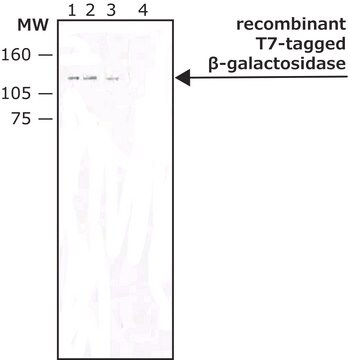HTS086M
ChemiSCREEN Human H2 Histamine Receptor Membrane Preparation
Human H2 GPCR membrane preparation for Radioligand binding Assays & GTPγS binding.
Autenticatiper visualizzare i prezzi riservati alla tua organizzazione & contrattuali
About This Item
Codice UNSPSC:
41106514
eCl@ss:
32161000
NACRES:
NA.81
Prodotti consigliati
Origine biologica
human
Livello qualitativo
Ricombinante
expressed in Chem-2 cells
Produttore/marchio commerciale
ChemiScreen
Chemicon®
tecniche
ligand binding assay: suitable (GTPγS)
radioligand binding assay (RLBA): suitable
N° accesso NCBI
N° accesso UniProt
Condizioni di spedizione
dry ice
Descrizione generale
Full-length human HRH2 cDNA encoding H2
The histamine H2 receptor is a widely distributed G-protein coupled receptor, which is important in regulating a host of physiologic actions extending from gastric acid secretion to gastrointestinal motility (Del Valle and Gantz, 1997). Histamine mediated activation of its receptor leads to signaling through both adenylate cyclase and phosphoinositide /protein kinase C second messenger systems (Hill, 1990). Antagonists for this receptor have proven to be effective therapy for acid peptic disorders of the GI tract. Certain antagonists are used in the treatment of neuropsychiatric and neurological diseases e.g. schizophrenia, Alzheimer′s disease and Parkinson′s disease. Chemicon′s H2 membrane preparations are crude membrane preparations made from our proprietary stable recombinant cell lines to ensure high-level of GPCR surface expression; thus, they are ideal HTS tools for screening of agonists and antagonists at H2. The membrane preparations exhibit a Kd of 0.8 nM for [125I]-Iodoaminopotentidine. With 0.65 nM [125I]-Iodoaminopotentidine, 10 µg/well H2 Membrane Prep typically yields greater than 7-fold signal-to-background ratio.
Applicazioni
Human H2 GPCR membrane preparation for Radioligand binding Assays & GTPγS binding.
Azioni biochim/fisiol
Protein Target: H2
Qualità
Table 1. Signal:background and specific binding values obtained in a competition binding assay with H2 membrane prep and unlabeled tiotidine.
SPECIFICATIONS: 1 unit = 10 µg
Bmax for [125I] Iodoaminopotentidine binding: 0.46 pmol/mg protein
Kd for [125I] Iodoaminopotentidine binding: ~0.8 nM
| 10 µg/well | |
|---|---|
| Signal:Background | 11.68 |
| Specific Binding (cpm) | 4152 |
SPECIFICATIONS: 1 unit = 10 µg
Bmax for [125I] Iodoaminopotentidine binding: 0.46 pmol/mg protein
Kd for [125I] Iodoaminopotentidine binding: ~0.8 nM
Specifiche
Inucbation Conditions
Membranes are mixed with radioactive ligand and unlabeled competitor (see Figures 1 and 2 for concentrations tested) in binding buffer in a nonbinding 96-well plate, and incubated for 1-2 h. Prior to filtration, an FC 96-well harvest plate (Millipore cat. # MAHF C1H) is coated with 0.33% polyethyleneimine for 30 min, then washed with 50mM HEPES, pH 7.4, 0.5% BSA. Binding reaction is transferred to the filter plate, and washed 3 times (1 mL per well per wash) with Wash Buffer. The plate is dried and counted.
Binding buffer: 50 mM Hepes, pH 7.4, 5 mM MgCl2, 1 mM CaCl2, 0.2% BSA, filtered and stored at 4°C
Radioligand: [125I] Iodoaminopotentidine (Amersham#: IM264)
Wash Buffer: 50 mM Hepes, pH 7.4, 500mM NaCl , 0.1% BSA, filtered and stored at 4°C.
Membranes are mixed with radioactive ligand and unlabeled competitor (see Figures 1 and 2 for concentrations tested) in binding buffer in a nonbinding 96-well plate, and incubated for 1-2 h. Prior to filtration, an FC 96-well harvest plate (Millipore cat. # MAHF C1H) is coated with 0.33% polyethyleneimine for 30 min, then washed with 50mM HEPES, pH 7.4, 0.5% BSA. Binding reaction is transferred to the filter plate, and washed 3 times (1 mL per well per wash) with Wash Buffer. The plate is dried and counted.
Binding buffer: 50 mM Hepes, pH 7.4, 5 mM MgCl2, 1 mM CaCl2, 0.2% BSA, filtered and stored at 4°C
Radioligand: [125I] Iodoaminopotentidine (Amersham#: IM264)
Wash Buffer: 50 mM Hepes, pH 7.4, 500mM NaCl , 0.1% BSA, filtered and stored at 4°C.
Stato fisico
One package contains enough membranes for at least 200 assays (units), where a unit is the amount of membrane that will yield greater than 7-fold signal:background with 125I-labeled Iodoaminopotentidine at 0.65 nM
Liquid in packaging buffer: 50 mM Tris pH 7.4, 10% glycerol and 1% BSA with no preservatives.
Packaging method: Membranes protein were adjusted to 1 mg/mL in packaging buffer, and dispensed at 1 mL/vial. Vials were rapidly frozen, and stored at -80oC.
Liquid in packaging buffer: 50 mM Tris pH 7.4, 10% glycerol and 1% BSA with no preservatives.
Packaging method: Membranes protein were adjusted to 1 mg/mL in packaging buffer, and dispensed at 1 mL/vial. Vials were rapidly frozen, and stored at -80oC.
Note legali
CHEMICON is a registered trademark of Merck KGaA, Darmstadt, Germany
Codice della classe di stoccaggio
12 - Non Combustible Liquids
Classe di pericolosità dell'acqua (WGK)
WGK 2
Punto d’infiammabilità (°F)
Not applicable
Punto d’infiammabilità (°C)
Not applicable
Certificati d'analisi (COA)
Cerca il Certificati d'analisi (COA) digitando il numero di lotto/batch corrispondente. I numeri di lotto o di batch sono stampati sull'etichetta dei prodotti dopo la parola ‘Lotto’ o ‘Batch’.
Possiedi già questo prodotto?
I documenti relativi ai prodotti acquistati recentemente sono disponibili nell’Archivio dei documenti.
J Del Valle et al.
The American journal of physiology, 273(5 Pt 1), G987-G996 (1997-12-31)
Histamine exerts multiple biological actions through one of three receptor subtypes (H1, H2, and H3). This review focuses on new developments regarding the structure and function of the H2 receptor. In addition to the important role this receptor plays in
S J Hill
Pharmacological reviews, 42(1), 45-83 (1990-03-01)
It is clear from the preceding overview of histamine receptor pharmacology that research into the pharmacology of histamine receptors is at an exciting stage of development. The rapid advance of molecular biology should soon see the structural identification and cloning
Il team dei nostri ricercatori vanta grande esperienza in tutte le aree della ricerca quali Life Science, scienza dei materiali, sintesi chimica, cromatografia, discipline analitiche, ecc..
Contatta l'Assistenza Tecnica.